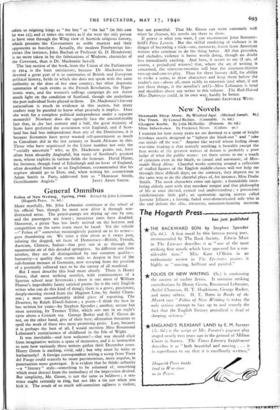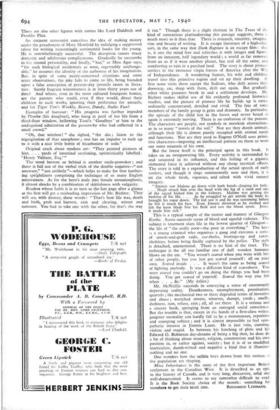New Novels
Glasgow Keelie. By John McNeillie. (Putnam. Bs. 6d.) Mine Inheritance. By Frederick Niven. (Collins. gs.)
I WONDER for how many years we are doomed to a spate of bright frivolous novels designed to "lighten the black-out" and "take our minds off the war." Anyone like myself whose feeling about war-time reading is that scarcely anything is bearable except the best works of the greatest writers of fiction is probably a poor judge of what the public wants : yet there seems to me a touch of cynicism even in the blurb, so casual and automatic, of Mer- maids Sleep Alone. Cheerful works centring around a collection of stuffed figures of the English middle-classes will not help me through these difficult days; on the contrary, they depress me in the same way as do the cheerful plays of, for instance, Miss Dodie Smith. The stock characters come out again: a formidable inter- fering elderly aunt with that mordent tongue and that philosophy of life at once shrewd, cynical and understanding ; a precocious exhibitionistic little girl ; an egomaniac ageing actress called Jasmine Jellacot ; a fussing, faded over-domesticated wife who in the end defeats the chic, attractive, sensation-hunting mistress.
There are also other figures with names like Lord Dulditch and Freddie Flux.
An eminent economist conceives the idea of making money under the pseudonym of Mary Manifold by indulging a suppressed talent for writing nauseatingly sentimental books for the young. He is overwhelmingly successful. The deception causes many domestic and adulterous complications. Gradually he succumbs to his second personality, and finally, "but," as Miss Agar says, "for such biological incidentals as were, regrettably unchange- able," he assumes the identity of the authoress of his imagination. But, in spite of some neatly-conceived situations and some acute observations, the joke fails to come to life, being founded upon a false conception of present-day juvenile tastes in litera- ture. Surely fragrant winsomeness is at least thirty years out of date? And where, even in the most cultured bourgeois homes, are the parents who could, even if they would, direct their children to such works, ignoring their preference for annuals, and for Tiger Tim's Weekly, Beano, Dandy, Radio Fun?
Examples of humour : "His progress was further impeded by Phoebe (his daughter), who hung at peril of her life from a third-floor window, bellowing Tosti's ' Goodbye ' at him to the undisguised admiration of the passers-by who had collected in a small crowd."
"Oh, that wireless! " she sighed, "the din ; listen to the regurgitation of that saxophone ; one has an impulse to rush up to it with a nice little bottle of bicarbonate of soda."
Original crack about modern art: "They painted pictures of him, . . . yards of intestinal sectioning, optimistically labelled: 'Henry Valliant, Esq.' " The word bottom or behind is another smile-provoker ; and there is full use of the verbal trick of the double negative—" not unaware," "not unlikely "—which helps to make for that lumber- ing sprightliness comprising the technique of so many English entertainers. As for the hero's male into female metamorphosis, it almost shocks by a combination of skittishness with vulgarity.
Readers whose habit it is to turn to the last page after a glance at the first will get a misleading impression of Mr. Richter. They will see, with dismay, these words: "That's how life was, death and birth, grub and harvest, rain and clearing, winter and summer. You had to take one with the other, for that's the way
it ran." Though there is .a slight element in The Trees of the kind of sententious platitudinising this passage suggests, there i.
much more to it than that. There is research, sincerity, imagina
tion and beauty of writing. It is escape literature of a high-cla- sort, in the same way that Dark Rapture is an escape film : thd is, it sets the mind free and refreshes it with images and figure,
from an innocent, half legendary world ; a world as far removed from us as if it were another planet, but real all the same, and
comforting as rain in a parched land. The story is about pioneer settlers in the immense virgin forests of America after the War of Independence. A wandering hunter, his wife and children travel into this primitive region and set up their dwelling. At first none visits them except the Indians, who drift across their
doorstep, eat, sleep with them, drift out again. But gradually other white pioneers break in and a settlement develops. Mr. Richter makes skilful use of his evidently profound historical studies, and the picture of pioneer life he builds up is extra- ordinarily concentrated, detailed and vivid. The fate of some members of the family group is grim and dramatic. In particular, the episode of the child lost in the forest and never heard ot again is extremely moving. There is no exaltation of the peasant.
The characters are people, not symbols or mawkish abstractions, as in so many "novels of the soil." Nor are they dumb animals, although their life is almost purely occupied with animal needs and functions. Nor are they used as Eugene O'Neill uses primi- tive characters—imposing an intellectual pattern on them to work out some neurosis of his own.
But the forest itself is the principal agent in this book. It
takes on an overpowering life. Every activity is surrounded by and saturated in its influence, and this feeling of a gigantic elemental force is achieved without any cheap mystical effects.
The story is told in a reproduction of the actual speech of early settlers, and though it rings sentimentally now and then, it is
on the whole fresh, vigorous, and salted with vivid natural imagery.
"Jimmie saw Malone go down with both hands clasping his belly. . . . Hugh struck him over the head with the leg of a stool and one of the squad kicked him in the kidneys. Malone was getting the bashing of his life. . . . As he struggled to get astride the body he brought his razor down. The kid saw it and he was screaming before he felt it touch his face. Even Jimmie shivered as he slashed and felt the keen blade bite his flesh and saw the blood spurt. Jesus, it made him sick."
This is a typical sample of the matter and manner of Glasgow Keelie. Scene succeeds scene of blood and squalid violence. The subject is tenement slum life in the lowest quarter of Glasgow— the life of "the really poor—the poor in everything." The hero 13 a young criminal who organises a gang and executes a serits of smash-and-grab raids, car-thefts, beatings-up and razor- slashings, before being finally captured by the police. The style is detached, unemotional. There is no hint of the tract. The technique is the all too familiar one of dull wooden hammer blows on the ear. "You weren't scared when you were with lots of other people, but you just got scared yourself: all on your own. Scared inside . . . It wasn't the same as being scared of fighting anybody. It was a different kind of scaredness. You were scared you couldn't go on doing the things you had been doing. You got scared of yourself. Scared the way you felt
when . . &c." (My italics.) Mr. McNeillie succeeds in conveying a sense of enormously depressing reality. Drunkenness, unemployment, prostitution, quarrels ; the mechanical two or three degraded terms of invective and abuse ; wretched streets, wharves, dumps, yards ; smells, darkness, rust, refuse, rain ; all, all are there. It is a serious and a sincere book, springing from an outraged social conscience. But the trouble is that, except in the hands of a first-class writer, gangster mentality can hardly fail to he a monotonous, repetitive and cramping subject ; and it is almost impossible to feel sym- pathetic interest in Jimmie Lunn. He is just vain, cunning, violent and stupid. In between his hatching of plots and his Edward G. Robinson day-dreams of being a big shot, he does do a bit of thinking about money, religion, communism and his own position in, or rather against, society ; but it is of so muddled, inarticulate, dumb-witted and negative a kind that it illumines nothing and no one.
One wonders how the militia boys drawn from this section of
the population are shaping.
Mine Inheritance is the story of the first important British
settlement in the Canadian West. It is described as an epic in the history of Canada, and is very long, discursive, solid and well-documented. It seems to me somewhat difficult to read. It is the Book Society choice of the month: something for members to get their teeth into. ROSAMOND LEHMANN.



































 Previous page
Previous page